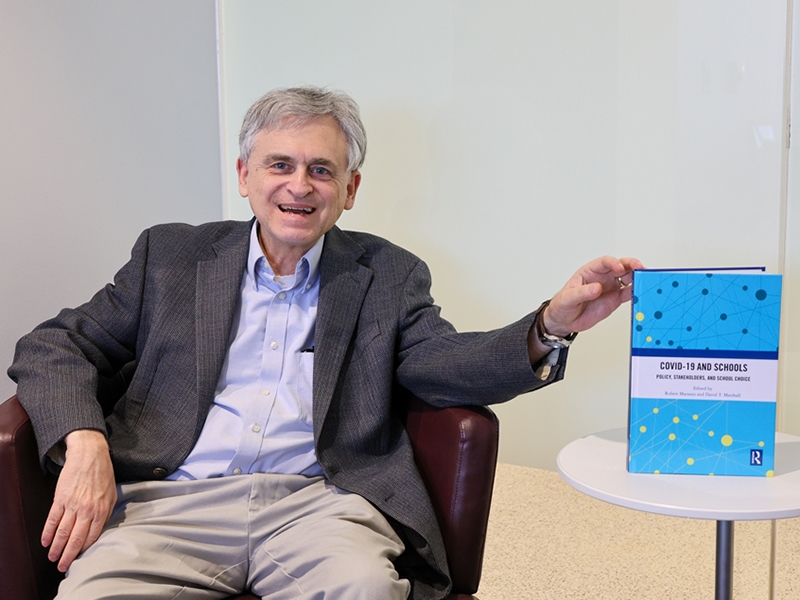Education Reform Professor's Book on COVID-19 and Schools Points to Lessons Learned

Professor Robert Maranto with his new book, "COVID-19 and Schools: Policy, Stakeholders, and School Choice."
The COVID-19 pandemic proved to be one of the most geographically widespread crises in the history of schooling, with 195 countries, the United States and tens of thousands of public schools, public charter schools and private schools forced to respond in myriad ways.
College of Education and Health Professions professor Robert Maranto and Auburn University associate professor David Marshall edited COVID-19 and Schools: Policy, Stakeholders, and School Choice to assess what was learned from the pandemic from a schooling perspective.
Maranto, the 21st Century Chair in Leadership in the Department of Education Reform, has done fieldwork in over 200 schools. He's also served five years on his local school board and more than 10 years on a cyber charter board. Marshall has served as chair of the Alabama Public Charter School Commission and as a middle and high school social studies teacher in Philadelphia.
COVID-19 and Schools, published by Routledge, brings together peer-reviewed research from leading experts on how the pandemic affected teachers, students, parents, teaching practices, enrollments and institutional innovations. The new book will offer the first empirical findings exploring significant educational impacts likely to last for decades.
Maranto and Marshall establish several key findings throughout the book, including that:
- Compared to other developed countries, U.S. physical schools stayed closed longer.
- School closings, openings and modes of instruction varied widely across states and school sectors (public, private and public charter schools).
- In all sectors, teachers found teaching during the pandemic more challenging than ever because of constantly changing policies and unprecedented demands to simultaneously teach students in physical, hybrid and purely online modes of instruction.
"Fear does not lead to good decision-making, so we made a lot of mistakes during COVID-19," Maranto said. "The global movement of people and goods brings enormous benefits, but it also means that a pandemic like this is likely to happen again because germs also cross borders. Next time, we will be better prepared."
Topics
Contacts
Sean Rhomberg, assistant director of communications
College of Education and Health Professions
479-575-7529,
smrhombe@uark.edu
Headlines
Affairs of the Heart
Find out how biomedical engineering professor Morten Jensen is developing innovative devices to produce better outcomes in cardiovascular medicine.
Students, Faculty and Alumni Kick Off Centennial Year of School of Law
Founded April 14, 1924, the School of Law faculty, students and alumni started the celebration of its centennial year with a Founders Day event and will continue with more commemorative events this coming fall.
Yearly Academic Award Winners, Ambassadors Recognized by Bumpers College
Schyler Angell, Lexi Dilbeck, Cason Frisby, Tanner Austin King, Anna Brooke Mathis, Carrie Ortel, Lucy Scholma, Kadence Trosper and student ambassadors were honored at the college's annual reception.
World Premiere of 'Cries from the Cotton Field' Slated for May 8
Cries from the Cotton Field chronicles the journey of 19th century Italian immigrants from northern Italy to the Arkansas Delta and ultimately to Tontitown. It will premier at 6 p.m. May 8 in Springdale Har-Ber High School.
Fay Jones School's Earth Day Event Spotlights Sustainable Materials and Projects
"One day doesn't seem like a lot, but one day can empower individuals and groups, energize them to work for change and innovate for transformative solutions," professor Jennifer Webb said of the students' design work.




